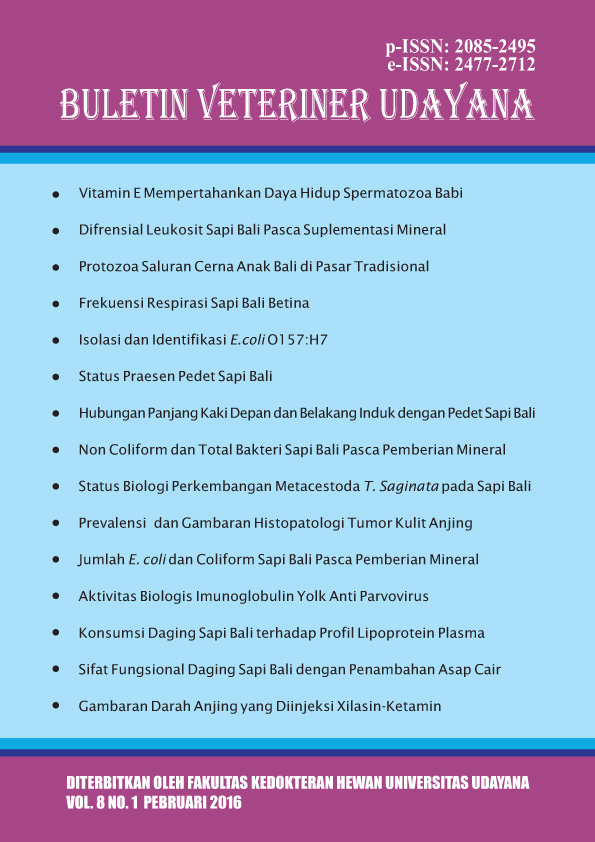PREVALENCE AND HISTOPATHOLOGY OVERVIEW OF SKIN TUMORS IN DOGS IN DENPASAR
Abstract
Skin tumors grow uncontrollably, invades the skin or soft tissue under the skin, can be benign or malignant. This research was conducted by analyzing risk factors : age and type associated with histopathological changes of 113 samples of dogs with skin tumors in Denpasar in 2008-2012 are diagnosed from the Laboratory Pathologic of Balai Besar Veteriner in Denpasar Bali. From this study, it’s identified 15 types of skin tumors in dogs in Denpasar, with respective prevalence were lipoma 28.32%, histiocytoma 10.62%, squamous cell carcinoma 8.85%,lymphosarcoma 6.19%, melanocytoma 6.19%, sebaceous gland tumors 6.19%, fibroma 5.31%,fibrosarcoma 5.31%, hemangioma 4.42%, hemangiosarcoma 4.42%, trichoepthelioma 4.42%,perianal gland adenoma 3.54%, liposarcoma 2.65%, mastocytoma 2.65%, and papilloma 0.88%.Prevalence of skin tumor in dogs in Denpasar based on the breeds and age’s wasn’t significantly different, it means skin tumor can spread either local and non local breed dog’s and can infect allages in dog’s. The histopathological changes from each kinds of skin tumors was different depended from the type of cells that grew uncontrollably, however generally they had unregulated structure with differential cell in various levels in chromatin, nucleus, and cytoplasmic.
Downloads
References
Berata IK, Winaya IBO, Adi AAAM, Adyana IBW dan Kardena IM. 2011. Patologi veteriner umum. Bahan Ajar. Fakultas Kedokteran Hewan UNUD, pp. 106-198.
Bronden LB, Eriksen T and Kristensen AT. 2010. Mast cell tummors and other skin neoplasia in danish dogs. J ACTA Vet Scandinavika, 52: 1-6.
David A. 1984. The dog, chartwell books. ISBN 0-89009-786-0, pp. 77-89.
Dobson JM. 2012. Review article: breed-predisposition to cancer in pedigree dog. Queen’s Veterinary School Hospital Department of Veterinary Medicine University of Cambr, Cambridge, UK. 13:16-17.
Elizabeth A, Nesbit, Perry J, Bain, Nicole C, Northrup, Kenneth S and Latimer. 2009. Departemen Pathology (Bain, Latimer) And Onkologi Departemen. University Of Georgia, Athens. GA 30602-7388.
Gorman N. 2010. Neoplasia of the skin and associated tissues. Waltham Center for Pet Nutrition Melton Mowbray, UK. Pp. 27-33.
Jasik AGN, Kozaczynski W and Rechert, M. 2009. Canine skin tumours with adenexal diferentietion histopethology and immuno histochemistry. Bulls Vet Ins Pulawy, 53: 227-283.
Kashyap DK, Tiwari SK, Giri DK, Dewangan G and Sinha B. 2013. Cutaneous and subcutaneous tissue neoplasma in canines: occurrence and histopathological studies. Afr J Bio Med Res, 8(49): 6569-6574.
Kelsey JL, Moore AS and Glickman LT. 1998. Epidemiologic studies of risk factors for cancer in pet dogs. Epidemiologic Review, 20(2): 204-217.
PetWave. 2012. Types of skin tumor in dog. http://www.petwave.com/Dogs/ Dog-Health-Center/Skin-Disorders /Skin-Tumor.aspx (diakses 30 November 2013)
Sharif M and Monier A. 2006. epidemiology of skin tumor entities according to the new who classification in dogs and cats. Fachbereich Veterinarmedizin der Justus-Liebig-Universitat Gieben. Pp. 10-36.
Todorova I. 2006. Prevalence and etiology of the moct common malignant tumours in dogs and cats. Departement of Surgery Faculty of Veterinary Medicine Trakia University, Strara Zagora Bulgaria, 9(2): 85-98.





